Iran sends four navy vessels to UAE for first time
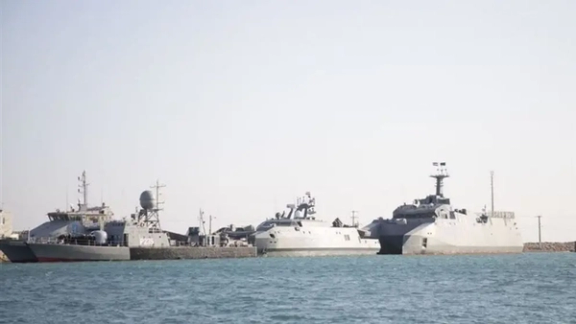
Iran has dispatched four vessels from its IRGC and army navies to the UAE for a meeting with Emirati naval forces.

Iran has dispatched four vessels from its IRGC and army navies to the UAE for a meeting with Emirati naval forces.
"We have repeatedly said that regional countries can ensure the region's security and that there is no need for foreign presence," IRGC navy chief Alireza Tangsiri was quoted as saying by state media.
In addition to Persian Gulf forces, coalition forces including the US, Iran's archenemy, have a strong presence around the Strait of Hormuz.
The UAE and Iran repaired diplomatic ties in 2022, abou six years after Abu Dhabi cut diplomatic relations in allegiance with Saudi Arabia after the 2016 looting of the Saudi embassy in Tehran. Saudi followed one year later.
The IRGC navy chief announced there will be ongoing drills with other countries neighboring Iran such as Oman, which was one of the mediators involved in the repairing of ties between Iran and Saudi Arabia.
"We have had engagements with Oman's navy in this regard and have participated in joint drills with Oman," he said.
A multi-purpose drone carrier will also be integrated into the IRGC navy, he said.
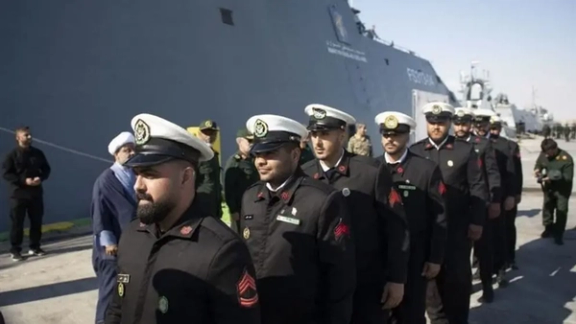

Kamal Kharrazi, a senior foreign policy advisor to Iran's Supreme Leader, expressed concern about what he called Israel's presence in Azerbaijan Republic, which borders Iran to the northwest.
"Countries should take their neighbors' sensitivities into consideration," Kharrazi said during a Sunday meeting with the Azeri presidential assistant Hikmet Hajiyev in Tehran.

Last month, Azerbaijani President Ilham Aliyev condemned remarks by Iranian cleric Seyyed Hassan Ameli, the Friday Prayer Leader of Ardabil who accused Azerbaijan of collaborating with Israel and described President Aliyev's policies as part of a "multi-billion-dollar gamble with the Israelis."
Tehran has long been critical of Baku’s close ties with Israel, while Azerbaijan has expressed frustration over Tehran’s alleged provocations, including inflammatory rhetoric by Iranian clerics and media.
On January 25, Azerbaijan’s Ministry of Foreign Affairs summoned the chargé d'affaires at Iran's Embassy in Baku to lodge a protest over alleged anti-Azerbaijan content in Iranian media.
Tensions further escalated earlier in January after Azerbaijan’s security services said they had foiled a plot to assassinate a prominent local Jewish figure for $200,000.
Two suspects were arrested, with Azerbaijani officials alleging they acted "under the guidance of a foreign country." While no nation was explicitly named, sources within Azerbaijan’s Jewish community have pointed to Iran.
Also in December, an Iranian lawmaker has accused the United States, Israel, and Azerbaijan of orchestrating the helicopter crash that claimed the life of former President Ebrahim Raisi, rejecting the official explanation of a weather-related malfunction as implausible.
Iranian officials have also been occasionally accusing Azerbaijan of allowing Israel to set up intelligence and military bases on its territory as an operational base against Iran.
However, Azerbaijan's ambassador to Israel Mukhtar Mammadov said in 2023 his country would not let Israel’s military to use Azerbaijan as a base for a possible attack against Iran.
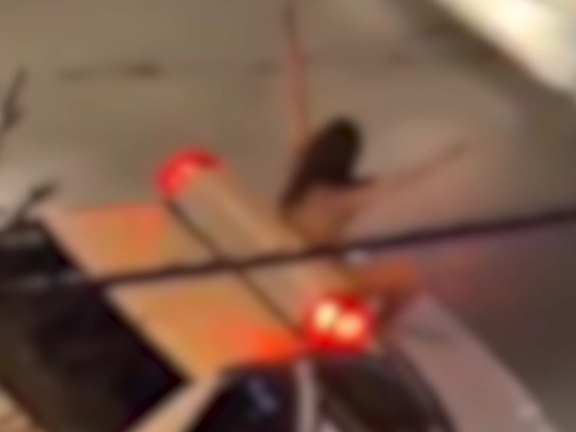
A video circulating on social media shows a woman standing naked on a police vehicle in Iran in the latest instance of a woman disrobing in public and dramatically flouting the Islamic Republic's dress strictures.
The exact time and location of the footage are unclear, but social media users say it has been recorded in the religious city of Mashhad within the past two weeks.
The new video is circulating three months after a similar incident at Tehran's Islamic Azad University, where a female Iranian student stripped to her underwear in protest after reportedly being assaulted by security forces.
During the student's arrest, Ahoo Daryaei was subjected to severe physical assault, including her head striking either a car door or a pillar, which caused heavy bleeding. “Blood stains from the student were reportedly seen on the car’s tires,” the report noted.
Since the emergence of the Woman, Life, Freedom movement in Iran, sparked by the death of Mahsa Amini in September 2022 while in police custody over hijab violations, hardliners have intensified efforts to enforce strict dress codes for women.
Despite widespread public defiance, government measures to reinforce mandatory hijab laws have escalated, resulting in the closure of businesses and the impoundment of vehicles associated with hijab offenses.
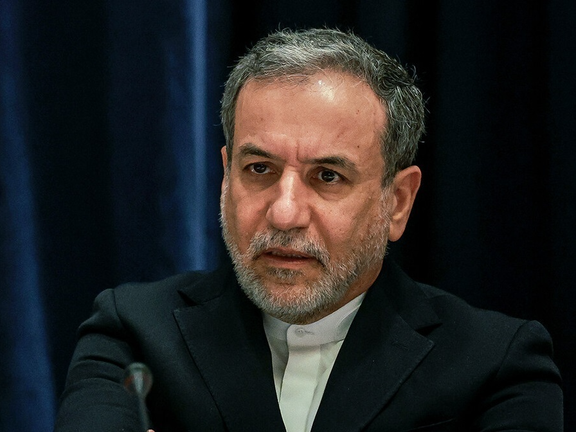
An Iranian daily criticized Foreign Minister Abbas Araghchi, arguing that his recent diplomatic approach toward the United States, particularly his demands for the release of blocked funds, has been misguided.
In a Sunday editorial, Ham-Mihan, a newspaper aligned with Iran’s Reformist faction, argued that the Foreign Ministry’s performance over the past six months has led to a diminished and weakened position in at least three key areas.
The newspaper pointed to Iran’s handling of overtures for negotiations with the United States as a key concern.
Iran’s policy toward Washington has long been a sensitive and contentious issue, especially after the US withdrawal from the JCPOA nuclear deal in 2018 and the imposition of sanctions. With President Donald Trump’s return, many Iranian politicians and commentators are voicing concerns over the possibility of harsher sanctions as the country struggles with a deep economic crisis.
Ham-Mihan said that efforts at engagement—whether overt or behind closed doors—have consistently encountered resistance from hardliners in both Tehran and Washington.
Beyond internal challenges, Ham-Mihan warned that Trump’s different view of foreign policy makes Iran’s diplomatic messaging particularly sensitive.
“One of Trump’s main arguments for withdrawing from the JCPOA was the lack of economic benefits for American companies,” the paper added, suggesting that any new diplomatic overtures must be framed in a way that aligns with Trump’s priorities.
Araghchi, however, has been criticized for failing to take such dynamics into account. The newspaper pointed to his recent interview with Al Jazeera, in which he asked for the release of frozen Iranian assets as a confidence-building measure.
Ham-Mihan argued that this approach misjudged Trump’s negotiating style and contrasted it with other Iranian officials who have suggested offering American companies investment opportunities in Iran instead.
The newspaper also expressed alarm over the apparent disarray within Iran’s foreign policy structure. Unlike the administration of President Hassan Rouhani where the foreign ministry led negotiations, figures like former Supreme National Security Council Secretary Ali Shamkhani and Strategic Council on Foreign Relations President Kamal Kharrazi now seem to be pursuing independent agendas, leading to confusion.
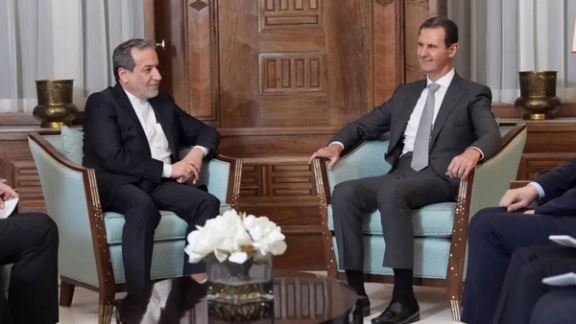
Additionally, Ham-Mihan criticized some of Araghchi’s recent regional visits, suggesting they have become more about symbolic appearances than meaningful diplomatic efforts.
The paper particularly highlighted his trips to Beirut and Damascus right before Bashar al-Assad's fall, arguing that they failed to achieve meaningful results to bolster Iran's influence and instead reinforced the country's image as a passive observer rather than an influential actor.
The newspaper urged Araghchi to reassess his approach, warning that without a more unified and strategic direction, the Foreign Ministry risks becoming increasingly sidelined in shaping Iran’s diplomatic agenda.
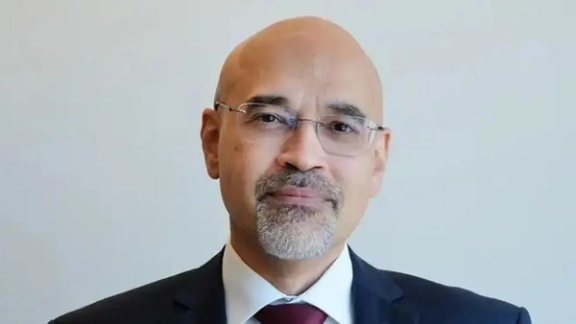
A Swedish lawmaker called for the dismissal of Rouzbeh Parsi from the Swedish Institute for International Affairs, following a media investigation linking him to a Tehran-directed influence network.
Nima Gholam Ali Pour, an Iranian-born member of Sweden’s Parliament, said on Saturday that Parsi, who heads the Middle East and North Africa program at the institute, should not be employed by an organization funded by taxpayers.
“I will continue to work on this issue in the Riksdag until Rouzbeh Parsi is fired. It is completely unacceptable that a person who has promoted the interests of the Iranian regime should work for a tax-financed organization in Sweden,” he wrote on X.
His remarks follow a report by Sweden’s TV4, which linked Parsi to a network established by Iran’s foreign ministry to influence Western policy. The network referenced emails shared by Iran International, which had earlier revealed Tehran’s attempts to influence foreign analysts in a 2023 collaborative investigation with Semafor.
Gholam Ali Pour highlighted Iran’s history of espionage and illicit operations in Sweden, writing, “The Iranian regime has been conducting espionage in Sweden for decades. The regime has also planned assassinations in Sweden and uses criminal networks in Sweden to carry out acts of violence against other states and individuals.”
His comments come months after Sweden’s Security Service and Israel’s Mossad warned that Tehran was leveraging criminal groups in Europe to target Israeli embassies and individuals.
According to Reuters, Sweden’s security agency announced in May that Iranian operations had extended to foreign diplomatic representatives as well as opposition figures within the Iranian diaspora.
In a reference to European efforts to designate Iran’s Islamic Revolutionary Guard Corps as a terrorist organization, Gholam Ali Pour questioned Parsi’s role. “Should we expect the Institute of Foreign Policy to also employ “researchers” who support North Korea, Russia and China?” he asked.
Parsi has denied any cooperation with Tehran, saying that while Iran sought to shape Western perspectives, his participation was in the interest of foreign governments, including the UK’s Foreign Office.
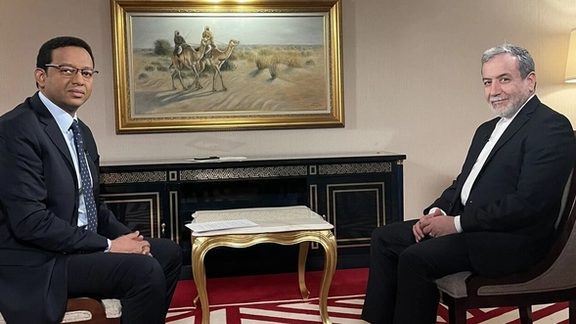
Iran would retaliate if its nuclear facilities were targeted, Foreign Minister Abbas Araghchi said, warning that such an attack would lead to a war in the region.
In an interview aired on Al Jazeera, Araghchi called military action against Iran’s nuclear sites “one of the greatest historical mistakes the US could make.”
His comments follow growing concerns in Tehran that a second Trump administration could green light an Israeli attack on Iran.
On January 23, Donald Trump said that he hoped a deal over Iran's nuclear program would make it so that the United States did not have to support an Israeli attack on Iran.
Asked by a reporter in the Oval Office whether he would support Israel striking Iran's nuclear facilities, Trump said: "Obviously, I'm not going to answer that question."
"It would really be nice if that could be worked out without having to go that further step ... Iran hopefully will make a deal, and if they don't make a deal, I guess that's okay too."
In his interview with Al Jazeera, Araghchi suggested that unfreezing Iranian assets could serve as a confidence-building measure facilitating a deal between the two sides.
“The US has frozen Iran’s assets in various locations and has not fulfilled its commitments to release them. This move could be the first step toward establishing trust between us,” he said.
Trump withdrew from the 2015 nuclear deal in 2018, reinstating sanctions as part of his maximum pressure strategy. Iran responded by expanding its nuclear activities beyond the agreement’s limits.
During his campaign, Trump has indicated he would restore his previous policies, aiming to secure a broader deal that includes Iran’s missile program and regional influence.
A spokesperson for Israeli Prime Minister said on Thursday that Israel is closely monitoring Iran’s actions.
Omer Dostri said Benjamin Netanyahu believes the aggressive policy Trump pursued in his previous administration should be reinstated.
“War is one way to achieve our objectives… Even if Iran claims to comply, we must remain skeptical – it could be a deception. Trump’s previous policy of ‘maximum pressure’ worked, and Israel expects to collaborate with him to restore it,” he told the Jerusalem Post.
“If a deal is possible, he will try to make a deal. But in the end, there’s a limit to how much diplomacy can achieve. We’ll give it a chance, but the clock is ticking. If necessary, we will act – with or without American approval.”